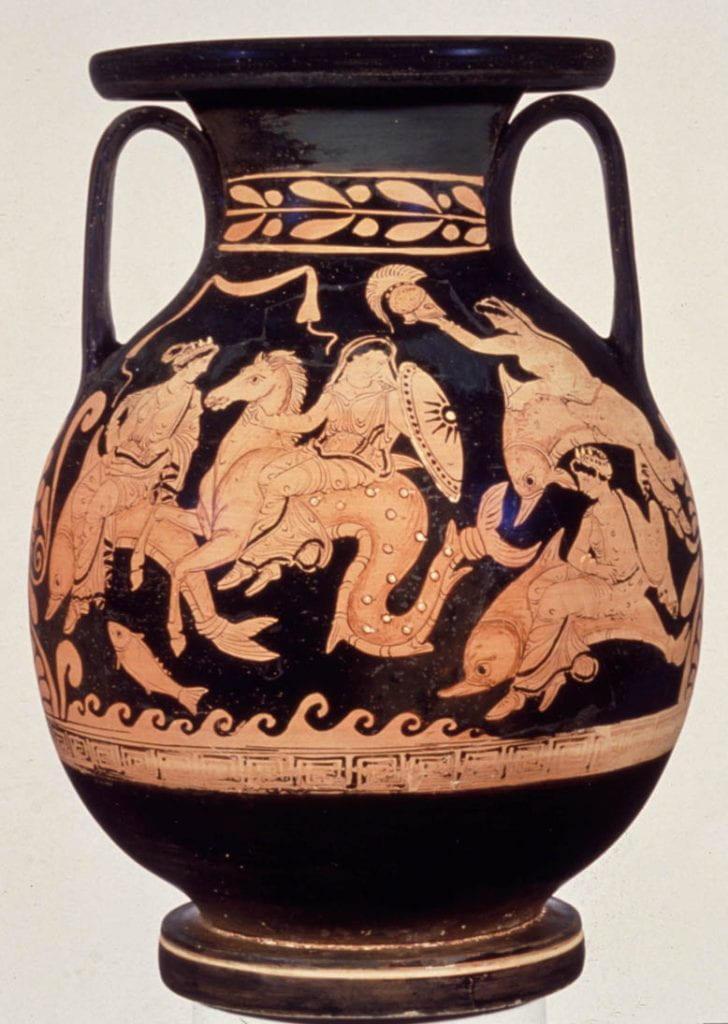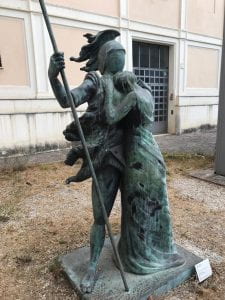GREECE
Oral tradition: reconstructed as far back as the second millennium BCE
Written versions: reconstructed as far back at the 6th century BCE
Homer,
Iliad
The ancient Greek epic poem known as the Iliad narrates an episode during the tenth year of the Trojan War, in which the hero Achilles, the son of the goddess Thetis and a mortal, Peleus, conceives a kind of cosmic wrath (mēnis) when his prize woman, Briseis, is taken from him by Agamemnon, the leader of the Greeks at Troy. It is an epic poem over 15,000 verses in length, but in reality, the story told in the Iliad is only one small component of a vast interconnected network of epic narratives about gods and heroes being told in antiquity.
The Iliad and Odyssey—attributed in antiquity to an almost certainly legendary poet named Homer—are synoptic representatives of an entire system of traditional songs that developed over many hundreds of years, and possibly thousands of years. In its earliest phases, this system included the song traditions of the (now lost) epics known collectively as the Epic Cycle and still further epic traditions to which the Iliad and Odyssey sometimes allude, such as the voyage of the Argo. These song traditions were multiform; they did not exist in a fixed form until very late in their evolution. But at the same time these epic tales were traditional, in that they were told as they had been handed down by previous generations of singers, who composed their songs in performance using a formulaic diction that had evolved over centuries for this purpose (Dué 2019).
Achilles’ wrath, initiated in book 1 of the Iliad, causes him to withdraw from battle, resulting in great losses for his Greek comrades. Achilles is the acknowledged “best of the Achaeans” (Iliad 1.244, 2.769), the best fighter at Troy. In his absence first Diomedes and then Patroklos step up to save the Greeks from the Trojan onslaught. Patroklos is the closest comrade of Achilles, and his death in book 16 is the reason that Achilles sets aside his wrath and comes back to battle, even though he knows that he himself will die if he does. The deaths of Patroklos at the hands of the Trojan prince Hektor, of Hektor at the hands of Achilles, and of Achilles at the hands of Paris (beyond the confines of the poem) are fundamentally interconnected in the Iliad. Achilles’ death is foreshadowed repeatedly after the death of Patroklos and prophesied by various characters, including by his mother, the goddess Thetis, who tells Achilles at Iliad 18.96: “Your own death awaits you straightaway after that of Hektor.” With his dying breath Patroklos foretells the death of Hektor, who in turn with his dying breath foretells the death of Achilles. This interconnectedness is made manifest in the exchange of armor that takes place among these three characters (Whitman 1958:199–203). Patroklos goes into battle wearing Achilles’ famous divinely crafted armor precisely in order that he be mistaken for Achilles. Hektor strips Patroklos of this armor upon killing him and puts it on himself. Achilles must get a new set of divinely made armor, in which he confronts Hektor, who is still wearing his old set. Each of these characters then becomes an embodiment of Achilles; in killing Patroklos, Hektor arguably kills Achilles as well, and in killing Hektor, Achilles kills himself.
The killing of Hektor in Iliad 22 is a victory and a moment of extreme satisfaction for the central hero of the Iliad, Achilles, and yet the epic camera immediately shifts, as we witness the gut-wrenching reactions of Hektor’s mother, father, and wife to his death. Similarly the Iliad ends with the funeral, not of Achilles, but of Hektor. Achilles’ own short life and coming death resonate throughout the laments that are sung for his deadliest enemy. The Iliad ends with the haunting songs of women who are soon to be the Greeks’ captive slaves—widowed, foreign, old and young, they are the antithesis of the Greek citizen ideal, the ultimate other. But the grief they initiate is a communal grief, a communal song of mourning that on the surface laments Hektor, but, from the perspective of the Iliad’s Greek audience, is even more fundamentally Achilles’ own song of sorrow (Nagy 1979:94-117).
First and foremost there is the lament of Andromache, Hektor’s wife and chief mourner (Iliad 24.719-776). Andromache’s words are reproachful, as is typical of Greek laments for the dead, and tell Hektor of the suffering that she and their son will have to endure now that Hektor has abandoned them in death. All of the things that Andromache fears come true (as we know from the surviving summaries of the now lost poems of the Epic Cycle and other attested myths). But at the same time her lament establishes the memory of Hektor as the guardian and sole protector of Troy for all time. His death means the city’s destruction, the death of the men, and the enslavement of the women and children. These same words initiate his heroic kleos, his glory that will live on in song. Her grief, and the city’s grief, are Hektor’s glory. The laments of Andromache and the other women of the Iliad therefore have a dual function. On the level of narrative they are laments for the dead, the warrior husbands and sons who inevitably fall in battle. They protest the cruel fate of the women left behind and narrate the bitter consequences of war. The grief expressed by these women is raw and real. But for the audience of ancient epic the laments for these husbands and sons are also the prototypical laments of heroes, who, for them, continue to be lamented and mourned as part of ancient Greek religion. As Thomas Greene has argued, the lamentation in epic collapses the boundaries between the audience and the heroic past, producing “a hallowed communion between the two.” He argues that in fact the goal of most of the European poetry known as epic is tears, and that through tears the communion between past and present is most accessible (Greene 1999:195).
In the Iliad, grief spreads quickly from individual to community. As each lament comes to a close, the immediately surrounding community of mourners antiphonally responds with their own cries and tears. It is not insignificant then that the final lament of the Iliad and indeed the final lines of the poem, sung by Helen (whose abduction by the Trojan prince Paris is the cause of the war), ends not with the antiphonal wailing of the women (as at Iliad 6.499, 19.301, 22.515, and 24.746), but of the people: “So she spoke lamenting, and the people wailed in response” (Iliad 24.776).
The Iliad looks at humanity without ethnic or any other distinctions that make people want to kill each other. It is not a poem that is anti-war: war was a fundamental and even sacred part of Greek culture. But it is a poem that can transcend ethnicity and lament the death of heroes in battle, whether they are Greek or Trojan, and it can even lament the death of the greatest Greek hero of them all, Achilles, by lamenting the death of his greatest enemy. It is a poem that can view Achilles through the eyes of his victims, through the sorrow that he generates, and at the same time experience and appreciate his own never-ending sorrow.
The Iliad is, ultimately, Achilles’ kleos. One of the primary metaphors for epic song in the Iliad is that of a flower that will never wilt, as Achilles himself tells us when he again refuses to return to battle in book 9 (Nagy 1979:174-184):
My mother the goddess Thetis of the shining feet tells me
that there are two ways in which I may meet my end.
If I stay here and fight around the city of Troy,
my homecoming is lost, but my glory in song [kleos] will be unwilting.
If I reach home, my kleos is lost, but my life will be long,
and the outcome of death will not soon take me. (Iliad 9.410-416)
Here Achilles reveals not only the crux of this choice of fates around which the Iliad itself is built, but also the driving principle of Greek epic song. The unwilting flower of epic poetry is contrasted with the necessarily mortal hero, whose death comes all too quickly.
University of Houston
Works Cited
Dué, Casey. 2018/2019. Achilles Unbound: Multiformity and Tradition in the Homeric Epics. Center for Hellenic Studies. Print edition: Harvard University Press, 2019.
Greene, Thomas. M. 1999. “The Natural Tears of Epic.” In Epic Traditions in the Contemporary World: The Poetics of Community. Eds. M. Beissinger, J. Tylus, and S. Wofford. Berkeley. 189-202.
Nagy, Gregory. 1979/1999. The Best of the Achaeans: Concepts of the Hero in Archaic Greek Poetry. Baltimore. Center for Hellenic Studies. Revised print edition: The Johns Hopkins University Press, 1999.
Whitman, Cedric H. 1958. Homer and the Heroic Tradition. Cambridge, MA.
Resources
Critical studies:
Alexiou, M. 1974/2002. The Ritual Lament in Greek Tradition. Center for Hellenic Studies. 2002. 2nd print edition: Lexington Books, 2002.
Bakker, E. 2020. “The Language of Homer.” In Pache 2020: 70–79.
Beissinger, M., J. Tylus, and S. Wofford, eds. 1999. Epic Traditions in the Contemporary World: The Poetics of Community. Berkeley.
Dué, C. 2002. Homeric Variations on a Lament by Briseis. Center for Hellenic Studies. 2002. Print edition: Lexington Books, 2002.
–––. 2007. “Learning Lessons From The Trojan War: Briseis and the Theme of Force.” College Literature 34: 229-262.
–––. 2018/2019. Achilles Unbound: Multiformity and Tradition in the Homeric Epics. Center for Hellenic Studies. Print edition: Harvard University Press, 2019.
Ebbott, M. 2020. “Homeric Epic in Performance.” In Pache 2020: 9–20.
Foley, J. 1991. Immanent Art: From Structure to Meaning in Traditional Oral Epic. Bloomington, IN.
–––. 1998. “Individual Poet and Epic Tradition: Homer as Legendary Singer.” Arethusa 31: 149–178.
Graziosi, B. 2002. Inventing Homer: The Early Reception of Epic. Cambridge.
Greene, T. M. 1999. “The Natural Tears of Epic.” In Beissinger, Tylus, and Wofford 1999: 189-202.
Lord, A. 1960/2000. The Singer of Tales. Center for Hellenic Studies. 2nd print edition (ed. S. Mitchell and G. Nagy): Harvard University Press, 2000.
Lowenstam, S. 1981. The Death of Patroklos: A Study in Typology. Königstein.
Martin, R. 1989. The Language of Heroes: Speech and Performance in the Iliad. Ithaca.
Muellner, L. 1996. The Anger of Achilles: Mênis in Greek Epic. Center for Hellenic Studies. Print edition: Cornell University Press, 1996.
Nagy, G. 1979/1999. The Best of the Achaeans: Concepts of the Hero in Archaic Greek Poetry. Baltimore. Center for Hellenic Studies. Revised print edition: The Johns Hopkins University Press, 1999.
–––. 2013. The Ancient Greek Hero in 24 Hours. Center for Hellenic Studies. Print edition: Harvard University Press, 2013.
–––. 2020. “From Song to Text.” In Pache 2020: 80–98.
Pache, C., ed. 2020. The Cambridge Guide to Homer. Cambridge.
Slatkin, L. 2011. 1991/2011. The Power of Thetis and Selected Essays. Center for Hellenic Studies. 2nd print edition: Harvard University Press, 2011.
Walsh, T. 2005. Fighting Words and Feuding Words: Anger and the Homeric Poems. Center For Hellenic Studies. Print edition: Lexington Books, 2005.
Whitman, C. 1958. Homer and the Heroic Tradition. Cambridge, MA.
The above bibliography was compiled by Casey Dué (University of Houston).
The Iliad. Columbia College, The Core Curriculum, Explorations.
The Homer Multitext project. “The Homer Multitext project seeks to present the Homeric Iliad and Odyssey in a critical framework that accounts for the fact that these poems were composed orally over the course of hundreds, if not thousands of years by countless singers who composed in performance.” Edited by Casey Dué (The University of Houston) and Mary Ebbott (The College of the Holy Cross).
For secondary school students: Greek Mythology: The Trojan War, the Iliad, and the Odyssey. Creative English Teacher at www.creativeenglishteacher.com.
A reading of the opening of the Iliad in Greek by Keith Dickson can be downloaded from First Lines: A Project in Global Diversity (Charles Ross, Purdue University).
An Iliad. By Denis O’Hare and Lisa Peterson.
Great Greek Myths: The Iliad. Season 1 (5 episodes), 2019. Directed by Sylvain BergereGaetan ChabanolCamille DalberaSebastien Rancourt. Available via Amazon Prime.
Homer in the epic maggio (an Italian folk opera tradition of the Tuscan-Emilian Apennines).
Boris Johnson recites extracts of The Iliad in Greek. In conversation with ABC’s Annabel Crabb at the Melbourne Writers Festival, 2019.
Mimmo Cuticchio, La morte di Patroclo. In Italian.
Studies on Homer in performance:
Heller, Wendy, and Eleonora Stoppino, eds. Performing Homer: The Voyage of Ulysses from Epic to Opera. Routledge, 2019.


